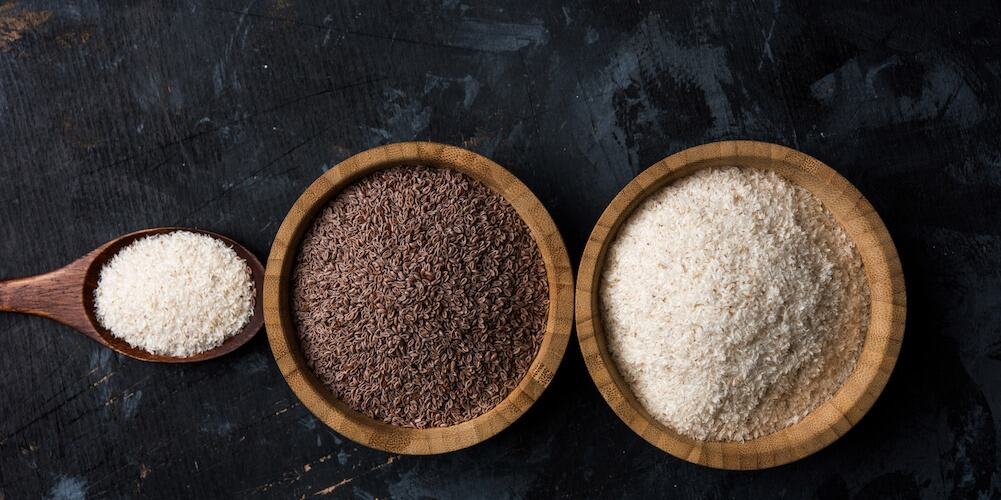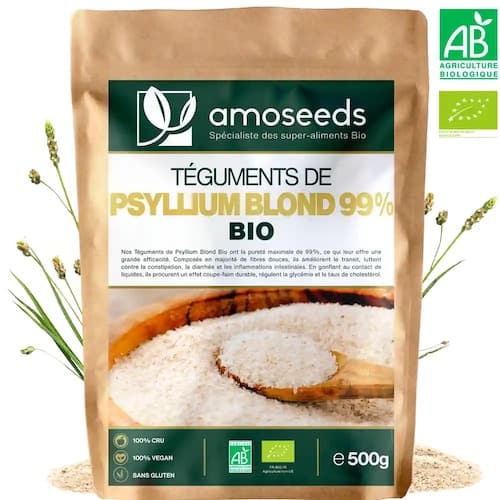BENEFITS OF PSYLLIUM
✓ Relieves constipation
✓ Fights diarrhea
✓ Protects the heart
✓ Helps with weight loss
What is psyllium?
Psyllium (Plantago ovata), or Indian plantain, is an herbaceous plant of the Plantaginaceae family. It originally grows in India and Pakistan, but it can also be found in temperate regions. It has pointed stems with flowering spikes during the summer that later produce very small seeds.
These tiny seeds are surrounded by a seed coat – a protective envelope mainly composed of mucilage. It is this mucilage that provides all of psyllium’s benefits. In fact, it is often this that is consumed rather than the whole seed. Its name comes from ancient Greek; it means ‘flea’ and refers to the tiny size of its grains!
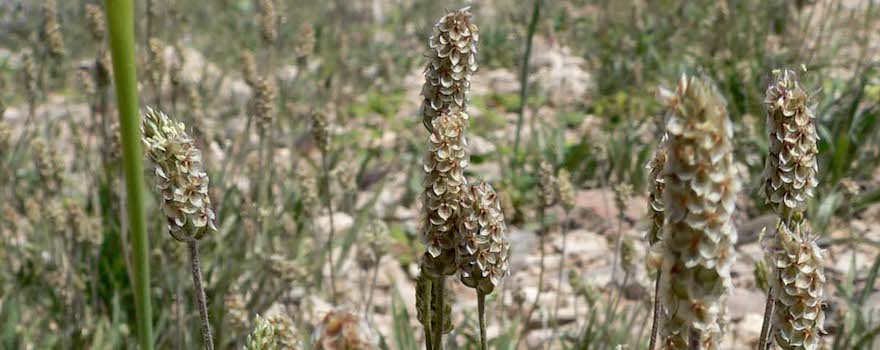
The food mainly discussed here is blond psyllium and not black psyllium (Plantago afra, native to the Mediterranean), because it is richer in mucilage. In fact, up to 30% of its seed consists of it! In India, it is traditionally used in Ayurvedic medicine, specifically to treat digestive problems. Indians call it Isabgol.
Psyllium is considered a prebiotic – not to be confused with a probiotic, that is, it promotes and preserves beneficial gut bacteria.
Providing a rich source of fiber, it is beneficial for gut health in several ways. In addition to being a prebiotic, it is a natural laxative. Conversely, it is also recommended to treat diarrhea, because it improves stool consistency. It helps to reduce inflammation of the stomach and intestines, and relieves pain and complications related to intestinal disorders.
These properties are recognized by the WHO and the Commission E, a scientific committee that aims to approve products used in traditional medicine.
Beyond these benefits directly related to the digestive system, it is recognized for its usefulness in the prevention of heart disease, and its ability to regulate blood sugar and blood lipid levels. It is also an ideal appetite suppressant for people wishing to control their weight! In this sense, it has properties similar to chia seeds.
Also read | Our tips for choosing psyllium
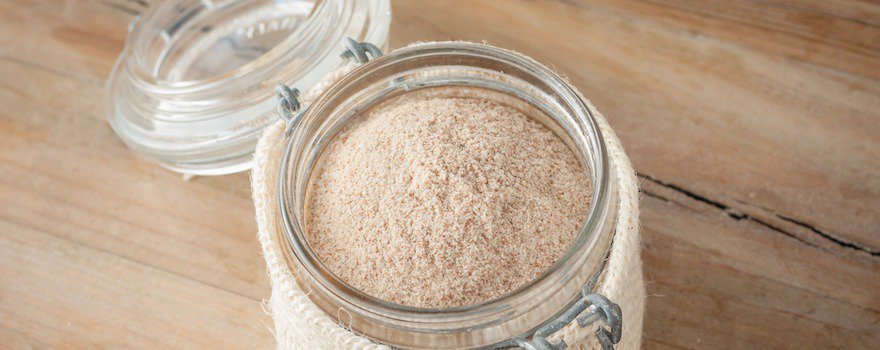
Nutritional composition
- Fiber
- Protein
- Carbohydrates
Buying organic psyllium: my picks
I recommend the organic psyllium from the French brand amoseeds. It is over 99% pure and comes from India (State of Uttar Pradesh), its place of origin.We recommend amoseeds because this company sources directly from local organic cooperatives. They therefore offer very high-quality products at more affordable prices.
We recommend amoseeds because this company sources directly from local organic cooperatives. They therefore offer very high-quality products at more affordable prices.
By using our promo code “DARWIN” you get 5% off on all their products (and up to 25% when buying the same product multiple times).
❤ I like : Excellent value for money, 99% purity and the brand’s positive customer reviews.
★ Customer reviews : 4.6/5
☞ Quantity : 500 g / 100 servings
✔ Discount code -5% : DARWIN
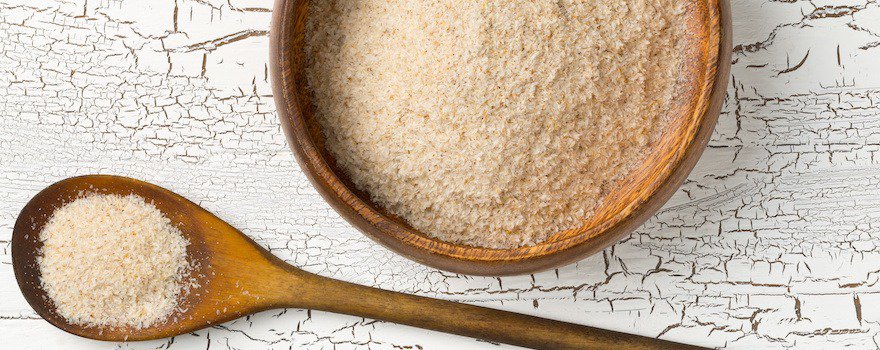
Benefits of psyllium
★ Relieves constipation
Psyllium is a natural laxative that helps effectively relieve constipation. Indeed, psyllium seeds are extremely rich in fiber. These are essential for our digestive system and also contribute to the proper functioning of our immune system.
Its mucilage is a soluble fiber: during digestion, it absorbs water from food and forms a gel. As a result, the weight of stools increases and their consistency is improved. This action greatly facilitates bowel movements and helps to treat and prevent constipation.
This study from the University of Wisconsin-Madison in the United States demonstrated that psyllium improves the appearance of stools, is more effective than other natural or synthetic laxatives, and causes less bloating than other fibers.
★ Fights diarrhea
Psyllium is likewise effective for treating diarrhea. Again, it is the mucilage that comes into play. By absorbing excess water in the intestines, it helps to solidify stools.
It is also recommended to relieve ulcerative colitis and irritable bowel syndrome.
This study from the University of Minnesota in the United States demonstrated that psyllium reduces diarrhea and fecal incontinence and improves the appearance of stools.
★ Protects the heart
Beyond its properties directly related to bowel transit and digestive health, psyllium helps protect the heart.
It lowers blood pressure significantly, particularly in overweight individuals with hypertension.
Since 1998 the Food and Drug Administration has allowed products containing psyllium to state that they may reduce the risk of coronary heart disease.
Furthermore, it regulates cholesterol in people with hypercholesterolemia, and blood sugar in people prone to diabetes. This could also help prevent the risks of cardiovascular disease.
This study from Daegu University in Korea, conducted in 2019 on rats, showed that psyllium helps reduce the risk of heart attacks.
★ Helps with weight loss
Finally, psyllium, low in calories, is an ideal ally for people looking to lose weight or keep it stable.
We have seen that the fibers it contains turn into a gel by absorbing water in the stomach, increasing the sensation of fullness. Psyllium then acts like an appetite suppressant.
This study from the University of Colorado demonstrated that psyllium promotes the feeling of fullness and curbs hunger between meals.
Expert opinion
The psyllium found in specialty stores is blond psyllium, derived from Indian plantain (Plantago ovata). While the seed itself is also of interest, it is usually the husk alone that is most often used. That is why it is essential to favor buying psyllium from organic farming.
💡Prebiotic properties: We are familiar with probiotics, those good bacteria present in foods like yogurts and lacto-fermented vegetables. We are less familiar with prebiotics: these are sugars that we cannot absorb, the fibers, which feed the good bacteria of our gut flora, thus promoting the development of a healthy, balanced microbiota. Thus, psyllium, because of its richness in fiber, supports the good health of the microbiota.
💡Drawbacks: where there are bacteria that eat, there are bacteria that produce gas… The fibers present in psyllium, while very useful for regulating transit, can ferment and cause pain and digestive discomfort. In cases of functional bowel disorder, irritable bowel syndrome, or sensitivity to certain FODMAPs, it is essential to listen to your body and stop consumption if negative effects appear.
💡Usage recommendation: as with any increase in fiber intake, start with small doses and increase gradually according to your digestive tolerance. Always respect the recommended maximum doses, and stay hydrated!
Perrine Bellanger – dietitian nutritionist
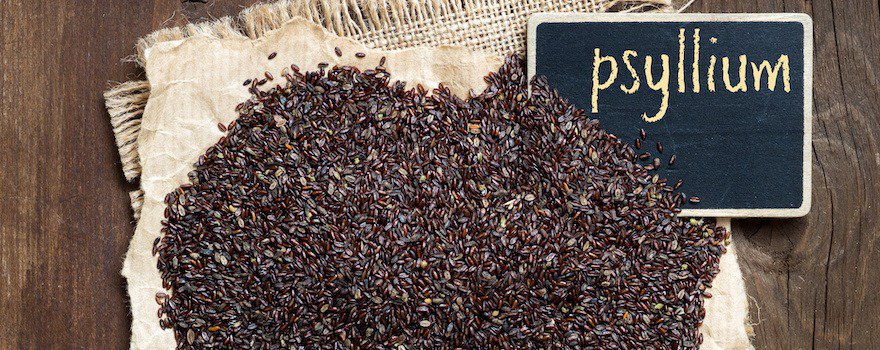
How to consume psyllium?
Blond psyllium, black psyllium, or brown psyllium
There are different varieties of psyllium. The blond psyllium (Plantago ovata) is native to India, Iran, and Pakistan, but can also grow in our latitudes. Its seeds are particularly rich in mucilage.
What is called black psyllium or brown psyllium (Plantago afra), also called “de Provence”, originally grows in the Mediterranean basin and in the Middle East. It has less mucilage than the blond variety, but the same properties are observed.
Prefer organic psyllium
It is recommended to favor organic psyllium, especially since the seed husk is consumed, in order to avoid any traces of pesticides. It can be obtained in organic and health food stores and in herbalist shops.
Psyllium powder
You will most often find bags of psyllium powder on the market. This powder is made up of thousands of seed coats (teguments), which can be easily mixed into liquids – water, fruit juices, applesauce… It also helps thicken smoothies, sauces, and baked goods.
Whatever the way it is consumed, remember to drink plenty of water afterwards – because it absorbs the water and turns into a gel on contact.
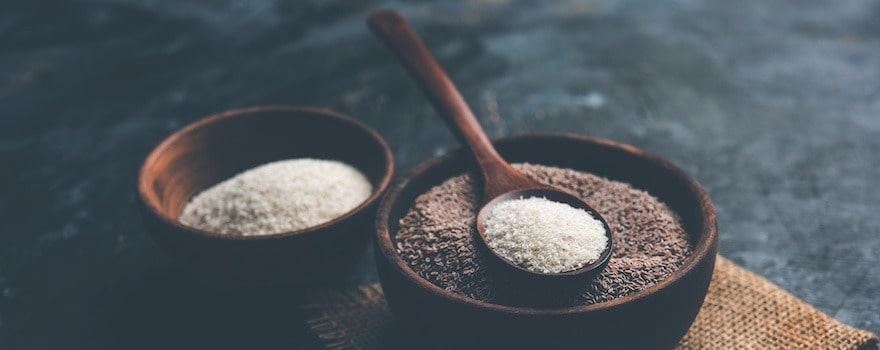
Psyllium capsules
If you do not wish to consume psyllium powder and add it to other foods, it is also available in capsule form. Again, always pay attention to its origin and composition, which must be 100% pure.
Psyllium recipes
Psyllium is extremely simple to use in the kitchen and allows you to thicken many recipes. And it is often used to replace gluten! Given its low glycemic index, it is particularly recommended for replacing flour in the making of breads, cakes, and pastries…
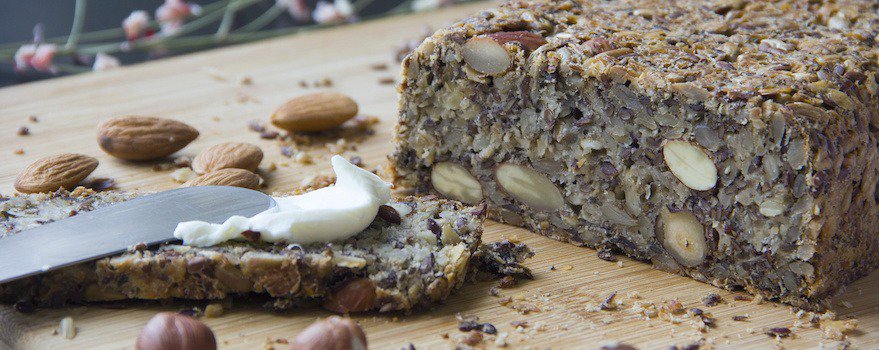
Dosage
The dosage to adopt depends on the desired effects. Generally, 10 g of psyllium is diluted in 100 ml of water.
To improve bowel transit and intestinal health: 2.5 g in the morning
For constipation: between 4 g and 7 g per day in two doses for 3 days
For diarrhea: up to 40 g per day in four separate doses for 3 days
In capsule form: 1 to 2 capsules per day
Contraindications and side effects
Consuming psyllium does not pose any health risk at the recommended doses.
- However, it is contraindicated to take it in cases of intestinal or esophageal stenosis.
- As it can reduce the absorption of some medications, it is not recommended during treatment and with the following dietary supplements: zinc, iron, calcium, magnesium, vitamin B12.
- You may sometimes experience bloating and intestinal disturbances; in that case, reduce the dose.
Also read | Does psyllium pose a danger and have side effects?


